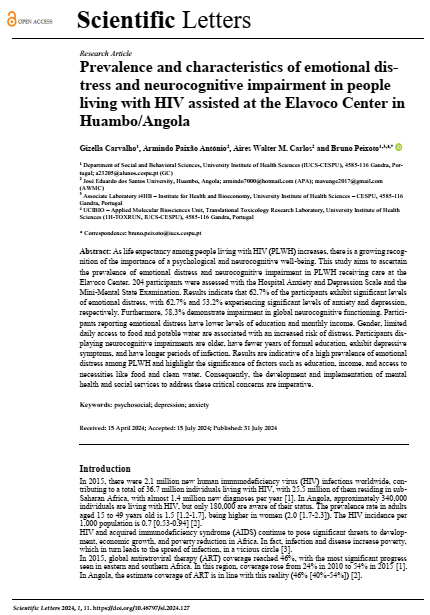Prevalence and characteristics of emotional distress and neurocognitive impairment in people living with HIV assisted at the Elavoco Center in Huambo/Angola
DOI:
https://doi.org/10.48797/sl.2024.127Keywords:
Psychosocial, depression, anxietyAbstract
As life expectancy among people living with HIV (PLWH) increases, there is a growing recognition of the importance of a psychological and neurocognitive well-being. This study aims to ascertain the prevalence of emotional distress and neurocognitive impairment in PLWH receiving care at the Elavoco Center. 204 participants were assessed with the Hospital Anxiety and Depression Scale and the Mini-Mental State Examination. Results indicate that 62.7% of the participants exhibit significant levels of emotional distress, with 62.7% and 53.2% experiencing significant levels of anxiety and depression, respectively. Furthermore, 58.3% demonstrate impairment in global neurocognitive functioning. Participants reporting emotional distress have lower levels of education and monthly income. Gender, limited daily access to food and potable water are associated with an increased risk of distress. Participants displaying neurocognitive impairments are older, have fewer years of formal education, exhibit depressive symptoms, and have longer periods of infection. Results are indicative of a high prevalence of emotional distress among PLWH and highlight the significance of factors such as education, income, and access to necessities like food and clean water. Consequently, the development and implementation of mental health and social services to address these critical concerns are imperative.
References
Joint United Nations Programme on HIV/AIDS (UNAIDS). Global AIDS Update 2016; Geneva, Switzerland, 2016.
Joint United Nations Programme on HIV/AIDS (UNAIDS). HIV in Angola. Availabe online: https://www.unaids.org/en/regionscountries/countries/angola (accessed on April 3rd 2024).
Whiteside, A. Poverty and HIV/AIDS in Africa. Third World Q 2002, 23, 313-332, doi:10.1080/01436590220126667.
Abas, M.; Ali, G.C.; Nakimuli-Mpungu, E.; Chibanda, D. Depression in people living with HIV in sub-Saharan Africa: time to act. Trop Med Int Health 2014, 19, 1392-1396, doi:10.1111/tmi.12382.
Bernard, C.; Dabis, F.; de Rekeneire, N. Prevalence and factors associated with depression in people living with HIV in sub-Saharan Africa: A systematic review and meta-analysis. PLoS One 2017, 12, e0181960, doi:10.1371/journal.pone.0181960.
Parcesepe, A.M.; Bernard, C.; Agler, R.; Ross, J.; Yotebieng, M.; Bass, J.; Kwobah, E.; Adedimeji, A.; Goulet, J.; Althoff, K.N. Mental health and HIV: research priorities related to the implementation and scale up of 'treat all' in sub-Saharan Africa. J Virus Erad 2018, 4, 16-25.
Brandt, R. The mental health of people living with HIV/AIDS in Africa: a systematic review. Afr J AIDS Res 2009, 8, 123-133, doi:10.2989/AJAR.2009.8.2.1.853.
Chibanda, D.; Benjamin, L.; Weiss, H.A.; Abas, M. Mental, neurological, and substance use disorders in people living with HIV/AIDS in low- and middle-income countries. J Acquir Immune Defic Syndr 2014, 67 Suppl 1, S54-67, doi:10.1097/QAI.0000000000000258.
Pence, B.W.; Mills, J.C.; Bengtson, A.M.; Gaynes, B.N.; Breger, T.L.; Cook, R.L.; Moore, R.D.; Grelotti, D.J.; O'Cleirigh, C.; Mugavero, M.J. Association of Increased Chronicity of Depression With HIV Appointment Attendance, Treatment Failure, and Mortality Among HIV-Infected Adults in the United States. JAMA Psychiatry 2018, 75, 379-385, doi:10.1001/jamapsychiatry.2017.4726.
Rane, M.S.; Hong, T.; Govere, S.; Thulare, H.; Moosa, M.Y.; Celum, C.; Drain, P.K. Depression and Anxiety as Risk Factors for Delayed Care-Seeking Behavior in Human Immunodeficiency Virus-Infected Individuals in South Africa. Clin Infect Dis 2018, 67, 1411-1418, doi:10.1093/cid/ciy309.
Lowther, K.; Selman, L.; Harding, R.; Higginson, I.J. Experience of persistent psychological symptoms and perceived stigma among people with HIV on antiretroviral therapy (ART): a systematic review. Int J Nurs Stud 2014, 51, 1171-1189, doi:10.1016/j.ijnurstu.2014.01.015.
Camara, A.; Sow, M.S.; Toure, A.; Sako, F.B.; Camara, I.; Soumaoro, K.; Delamou, A.; Doukoure, M. Anxiety and depression among HIV patients of the infectious disease department of Conakry University Hospital in 2018. Epidemiol Infect 2020, 148, e8, doi:10.1017/S095026881900222X.
Antinori, A.; Arendt, G.; Becker, J.T.; Brew, B.J.; Byrd, D.A.; Cherner, M.; Clifford, D.B.; Cinque, P.; Epstein, L.G.; Goodkin, K., et al. Updated research nosology for HIV-associated neurocognitive disorders. Neurology 2007, 69, 1789-1799, doi:10.1212/01.WNL.0000287431.88658.8b.
Wang, Y.; Liu, M.; Lu, Q.; Farrell, M.; Lappin, J.M.; Shi, J.; Lu, L.; Bao, Y. Global prevalence and burden of HIV-associated neurocognitive disorder: A meta-analysis. Neurology 2020, 95, e2610-e2621, doi:10.1212/WNL.0000000000010752.
Wei, J.; Hou, J.; Su, B.; Jiang, T.; Guo, C.; Wang, W.; Zhang, Y.; Chang, B.; Wu, H.; Zhang, T. The Prevalence of Frascati-Criteria-Based HIV-Associated Neurocognitive Disorder (HAND) in HIV-Infected Adults: A Systematic Review and Meta-Analysis. Front Neurol 2020, 11, 581346, doi:10.3389/fneur.2020.581346.
Xavier, P.B.; Peixoto, B. Emotional distress in Angolan patients with several types of tuberculosis. Afr Health Sci 2015, 15, 378-384, doi:10.4314/ahs.v15i2.10.
Bjelland, I.; Dahl, A.A.; Haug, T.T.; Neckelmann, D. The validity of the Hospital Anxiety and Depression Scale. An updated literature review. J Psychosom Res 2002, 52, 69-77, doi:10.1016/s0022-3999(01)00296-3.
Ibbotson, T.; Maguire, P.; Selby, P.; Priestman, T.; Wallace, L. Screening for anxiety and depression in cancer patients: the effects of disease and treatment. Eur J Cancer 1994, 30A, 37-40, doi:10.1016/s0959-8049(05)80015-2.
Pais-Ribeiro, J.; Silva, I.; Ferreira, T.; Martins, A.; Meneses, R.; Baltar, M. Validation study of a Portuguese version of the Hospital Anxiety and Depression Scale. Psychol Health Med 2007, 12, 225-235; quiz 235-227, doi:10.1080/13548500500524088.
Guerreiro, M.; Silva, A.P.; Botelho, M.A.; Leitão, O.; Castro-Caldas, A.; Garcia, C. Adaptation to the Portuguese population of the Mini-Mental State examination. Rev Port Neurol 1994, 1, 9-10.
Pintos, C.S.E. Normalização do Mini-Mental State Examination para a população de Benguela. University Institute of Health Sciences (IUCS-CESPU), Gandra, Paredes, 2012.
Pereira, M.; Fialho, R.; Canavarro, M.C. Prevalence and correlates of emotional distress in HIV/HCV coinfection. AIDS Care 2014, 26 Suppl 1, S56-64, doi:10.1080/09540121.2014.906549.
Kaharuza, F.M.; Bunnell, R.; Moss, S.; Purcell, D.W.; Bikaako-Kajura, W.; Wamai, N.; Downing, R.; Solberg, P.; Coutinho, A.; Mermin, J. Depression and CD4 cell count among persons with HIV infection in Uganda. AIDS Behav 2006, 10, S105-111, doi:10.1007/s10461-006-9142-2.
Kagee, A.; Martin, L. Symptoms of depression and anxiety among a sample of South African patients living with HIV. AIDS Care 2010, 22, 159-165, doi:10.1080/09540120903111445.
Bernatsky, S.; Souza, R.; de Jong, K. Mental health in HIV-positive pregnant women: results from Angola. AIDS Care 2007, 19, 674-676, doi:10.1080/09540120601012705.
Wouters, E.; Booysen Fle, R.; Ponnet, K.; Baron Van Loon, F. Wording effects and the factor structure of the Hospital Anxiety & Depression Scale in HIV/AIDS patients on antiretroviral treatment in South Africa. PLoS One 2012, 7, e34881, doi:10.1371/journal.pone.0034881.
Adewuya, A.O.; Afolabi, M.O.; Ola, B.A.; Ogundele, O.A.; Ajibare, A.O.; Oladipo, B.F. Psychiatric disorders among the HIV-positive population in Nigeria: a control study. J Psychosom Res 2007, 63, 203-206, doi:10.1016/j.jpsychores.2007.03.006.
Pappin, M.; Wouters, E.; Booysen, F.L. Anxiety and depression amongst patients enrolled in a public sector antiretroviral treatment programme in South Africa: a cross-sectional study. BMC Public Health 2012, 12, 244, doi:10.1186/1471-2458-12-244.
Marbaniang, I.; Sangle, S.; Nimkar, S.; Zarekar, K.; Salvi, S.; Chavan, A.; Gupta, A.; Suryavanshi, N.; Mave, V. The burden of anxiety among people living with HIV during the COVID-19 pandemic in Pune, India. BMC Public Health 2020, 20, 1598, doi:10.1186/s12889-020-09656-8.
Nyirenda, M.; Chatterji, S.; Rochat, T.; Mutevedzi, P.; Newell, M.L. Prevalence and correlates of depression among HIV-infected and -affected older people in rural South Africa. J Affect Disord 2013, 151, 31-38, doi:10.1016/j.jad.2013.05.005.
Kondirolli, F.; Sunder, N. Mental health effects of education. Health Econ 2022, 31 Suppl 2, 22-39, doi:10.1002/hec.4565.
Woods, S.P.; Moore, D.J.; Weber, E.; Grant, I. Cognitive neuropsychology of HIV-associated neurocognitive disorders. Neuropsychol Rev 2009, 19, 152-168, doi:10.1007/s11065-009-9102-5.
Eggers, C.; Arendt, G.; Hahn, K.; Husstedt, I.W.; Maschke, M.; Neuen-Jacob, E.; Obermann, M.; Rosenkranz, T.; Schielke, E.; Straube, E., et al. HIV-1-associated neurocognitive disorder: epidemiology, pathogenesis, diagnosis, and treatment. J Neurol 2017, 264, 1715-1727, doi:10.1007/s00415-017-8503-2.
Thames, A.D.; Becker, B.W.; Marcotte, T.D.; Hines, L.J.; Foley, J.M.; Ramezani, A.; Singer, E.J.; Castellon, S.A.; Heaton, R.K.; Hinkin, C.H. Depression, cognition, and self-appraisal of functional abilities in HIV: an examination of subjective appraisal versus objective performance. Clin Neuropsychol 2011, 25, 224-243, doi:10.1080/13854046.2010.539577.

Downloads
Published
How to Cite
Issue
Section
License
Copyright (c) 2024 Gizella Carvalho, Armindo Paixão António , Aires Walter M. Carlos, Bruno Peixoto

This work is licensed under a Creative Commons Attribution 4.0 International License.
In Scientific Letters, articles are published under a CC-BY license (Creative Commons Attribution 4.0 International License), the most open license available. The users can share (copy and redistribute the material in any medium or format) and adapt (remix, transform, and build upon the material for any purpose, even commercially), as long as they give appropriate credit, provide a link to the license, and indicate if changes were made (read the full text of the license terms and conditions of use).
The author is the owner of the copyright.








